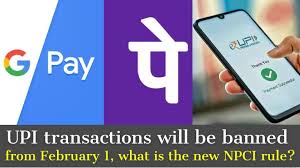NPCI Implements Stricter UPI Rules from February 1, 2025
The National Payments Corporation of India (NPCI) has announced stricter rules for the Unified Payments Interface (UPI) transactions starting February 1, 2025. These changes are aimed at enhancing security, reducing fraud, and improving the overall UPI ecosystem. The new regulations include limits on the number of transactions, mandatory authentication for certain types of payments, and the introduction of additional security features for users and merchants.
What are the New UPI Rules?
Under the updated guidelines, the NPCI will impose limits on the number of transactions a user can make per day. Additionally, certain transactions that exceed specific amounts will require further authentication to ensure the legitimacy of the payments. The new rules are designed to reduce the risks associated with large transactions and unauthorized access.
Merchants will also be required to integrate more secure methods for processing payments. The NPCI has mandated that all merchant transactions will need additional verification to safeguard against fraudulent activities. This comes as a measure to protect consumers and businesses alike from financial crimes and cyberattacks.

Why This News is Important
Significance of Stricter UPI Rules for Security
The new regulations introduced by NPCI are crucial in the current landscape of digital payments. UPI has revolutionized the way financial transactions are carried out in India. As more people rely on mobile payments for everyday transactions, the need for stronger security measures has become evident. The stricter UPI rules aim to prevent cybercrimes such as unauthorized access, phishing, and fraudulent transactions.
Furthermore, these changes come at a time when India is striving to boost digital financial inclusion and promote a cashless economy. By ensuring the security of digital payment platforms like UPI, the government aims to instill confidence among users and encourage further adoption of digital transactions.
Relevance to Government Exam Aspirants
For students preparing for various government exams, particularly those focusing on banking, economics, and current affairs, staying updated with such policy changes is vital. The UPI is an essential topic in several competitive exams, including those for positions in banking, police services, civil services, and other government roles. Knowledge of the latest changes in financial regulations, digital economy advancements, and payment systems is critical for these aspirants.
Historical Context: Background Information
The introduction of UPI by NPCI in 2016 marked a revolutionary step in India’s digital payment landscape. Designed to simplify inter-bank transactions and eliminate the need for cash, UPI quickly gained popularity due to its ease of use and speed. Over the years, UPI has become one of the largest real-time payment systems in the world, with billions of transactions being processed every month.
However, with the increasing volume of digital payments, the risk of cybercrime and fraud also escalated. In response, NPCI and other regulatory bodies have continuously adapted and updated security protocols to safeguard users. The introduction of stricter UPI rules is just the latest in a series of measures designed to keep the system secure and robust.
Key Takeaways from NPCI Implements Stricter UPI Rules
| Serial No. | Key Takeaway |
|---|---|
| 1 | NPCI introduces stricter UPI rules from February 1, 2025, to enhance payment security. |
| 2 | Users will face limits on the number of transactions they can make per day. |
| 3 | Transactions exceeding certain amounts will require additional authentication. |
| 4 | Merchants must integrate more secure methods to process payments under the new guidelines. |
| 5 | These changes are aimed at reducing fraud and safeguarding users in the rapidly growing digital payments ecosystem. |
Important FAQs for Students from this News
1. What are the new UPI rules introduced by NPCI?
The new UPI rules introduced by NPCI focus on enhancing security. These include transaction limits, additional authentication for high-value transactions, and stricter measures for merchants to ensure safe and secure payments.
2. Why were these stricter UPI rules implemented?
The stricter UPI rules aim to protect users from cybercrimes such as unauthorized access and fraud. As UPI continues to grow in usage, ensuring a secure environment for digital transactions becomes more critical.
3. When will the new UPI rules come into effect?
The updated UPI rules will be implemented starting from February 1, 2025.
4. How will these changes affect users?
Users may face restrictions on the number of transactions they can make each day and will need to provide additional authentication for high-value transactions. These changes are designed to enhance security and reduce the risk of fraudulent activities.
5. Will merchants be affected by these new rules?
Yes, merchants will also be required to implement more secure methods for processing payments, ensuring that all transactions are safe and verified to prevent fraud.
6. How does this impact students preparing for government exams?
Students preparing for government exams should be aware of these changes as UPI and digital payments are important topics in exams related to banking, economics, and current affairs.
7. Are there any other similar regulations related to digital payments?
Yes, NPCI and the government have consistently introduced measures to enhance digital payment security over the years, including features like two-factor authentication and digital wallets. The new UPI rules are part of these ongoing efforts.
Some Important Current Affairs Links

















